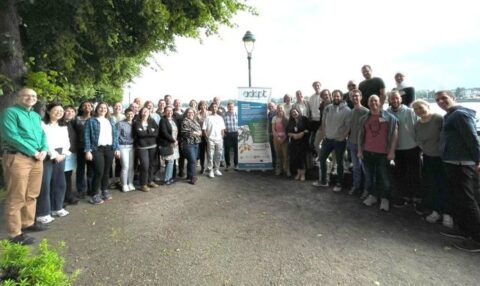ADAPT Network Meeting in Bonn
At the end of May, the members of the EU-funded ADAPT project met for a two-day project meeting in Bonn (photo).
Following previous years’ network meetings in Brno (CZE), Wageningen (NLD) and Ljubljana (SVN), this was the fourth and final meeting of the European wide academic and industrial project partners in the ADAPT project, who wanted to answer the question of how potato plants can be adapted to the consequences of climate change.
The focus of the consortium was to break down the molecular and phenotypic responses of potato plants to combined and sequential appearing environmental stresses such as heat, drought or flooding.
As representatives of the Chair of Biochemistry, Sophia Sonnewald, Selina Beck and Christian Schuy took part in the discussions on how the knowledge gained by the interdisciplinary team over the four-year project period can be pooled, published and used for potential further research approaches beyond the end of the ADAPT project.
Selina Beck (pictured) presented the results of her latest analyses of the molecular, biochemical and physiological responses of potato varieties that react contrastingly to heat application. These comprehensive observations can help to understand why some potato varieties are more sensitive or tolerant to heat stress.
Christian Schuy presented the latest findings on the dynamics of SP6A activity in different tissues of the potato plant. This gene is centrally involved in the molecular regulation of tuber formation and is strongly negatively influenced by heat stress.
In addition to local cuisine (Bönnsch & gummy bears), the agenda also included a look beyond the edge of the scientific (potato) plate at the botanical garden in Bonn. This place is strongly associated with the first scientific description of the lotus effect.

